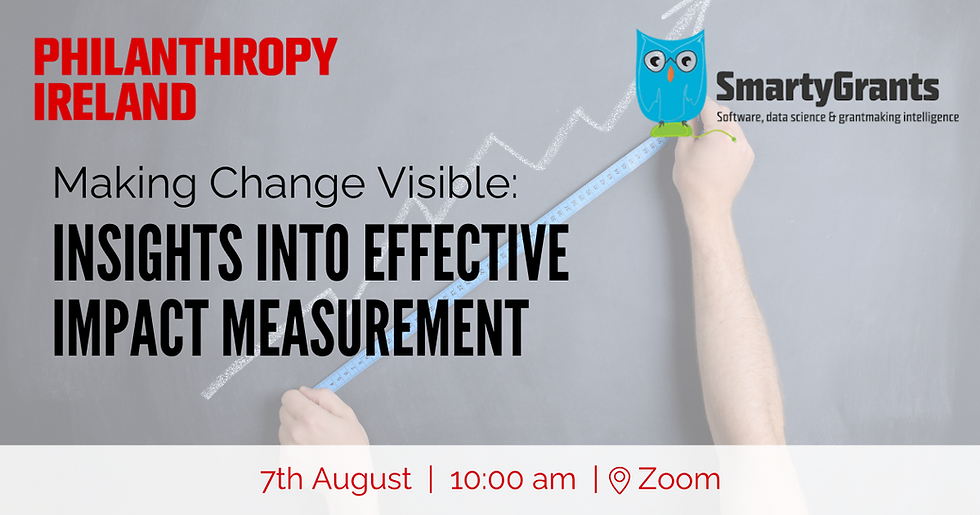The Future of the Irish State: 2025 and Beyond – TASC
- Jun 20, 2025
- 3 min read
Updated: Jul 14, 2025
By: Sean Collins, Philanthropy Ireland

The report "The Future of the Irish State: 2025 and Beyond" presents a timely and urgent call for a more interventionist and visionary Irish state. It outlines how Ireland must respond proactively to major structural challenges—namely climate change, the digital revolution, and a worsening cost-of-living crisis. For grantmakers and founders, the report offers a strategic lens through which to identify high-impact areas for investment and innovation. It emphasises that while Ireland currently enjoys strong macroeconomic indicators, this growth masks serious and persistent underinvestment in critical infrastructure. Sectors such as housing, transport, healthcare, and sustainable energy remain inadequately resourced, constraining both quality of life and future economic competitiveness. These gaps open the door for philanthropic actors and mission-driven founders to pilot scalable, community-led solutions that address both immediate needs and long-term systemic deficiencies.
One of the central themes of the report is the need for a just climate transition. Far from framing environmental action as a trade-off against jobs, the report advocates for leveraging the transition to a low-carbon economy as a catalyst for job creation and local economic development. It calls for increased investment in green-skilling programs and the adoption of “community wealth building” models to ensure that climate action supports sustainable livelihoods. For grantmakers focused on climate justice and economic equity, this represents an opportunity to back initiatives that build local capacity and create inclusive green jobs—especially in under-resourced or rural areas. Founders in the clean tech, circular economy, and conservation sectors can also align with this agenda by developing solutions that link decarbonization with workforce development and regional regeneration.
The report also delves into the transformative impact of artificial intelligence on the public sector. It cautions that without thoughtful planning, AI may exacerbate job displacement and inequality. However, it also acknowledges the potential of AI to improve productivity and service delivery if it is implemented in ways that complement, rather than replace, human labor. In this context, the report recommends strong public investment in upskilling programs, particularly in interpersonal and problem-solving skills that are less likely to be automated. It also stresses the need for ethical AI deployment, worker protections, and transparency. For social innovators, this represents an important frontier—where civic tech, AI for public good, and digital rights intersect. Grantmakers could play a critical role in supporting pilot programs, AI literacy campaigns, and partnerships between government and civil society to ensure equitable digital transformation.
Cost-of-living concerns are another major focus, particularly as they relate to public service workers. The report highlights how rising housing costs, poor transport infrastructure, and limited access to essential services are making it increasingly difficult for workers—especially younger ones—to live and work affordably. These pressures are contributing to staff shortages, longer commutes, and low morale within the public sector. This creates a clear opportunity for grantmakers and founders to intervene. Areas like affordable housing innovation, food and energy self-sufficiency, and flexible work infrastructure are prime for experimentation and funding. Initiatives that reduce commuting burdens, such as remote work hubs or rural transit networks, can directly improve quality of life and support recruitment and retention across the public sector.
Finally, the report points to a broader societal challenge: the growing gap between government optimism and public perception. Despite positive macroeconomic narratives, many people feel left behind, disillusioned, or disconnected from decision-making processes. This erosion of trust in public institutions is seen as a driver of political discontent and the rise of far-right activism. For grantmakers concerned with democracy, inclusion, and social cohesion, this underscores the need to support participatory governance models, civic education, and community-driven policy engagement. Founders working on digital inclusion, data transparency, and civic platforms can also help bridge this gap by equipping citizens with the tools and knowledge to engage meaningfully with the state.
In summary, the report is a call to action for bold, coordinated responses that bridge policy ambition with lived realities. For both funders and social innovators, it highlights multiple intersecting pathways where targeted investment can contribute to a more equitable, sustainable, and democratic Ireland.





Comments